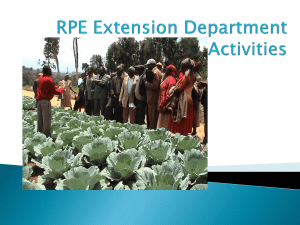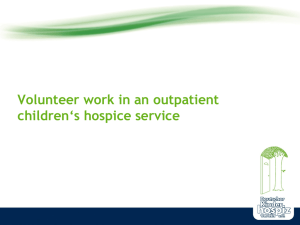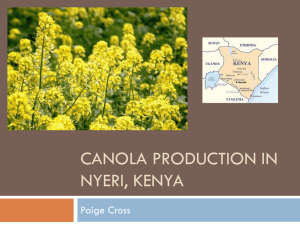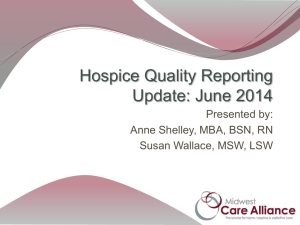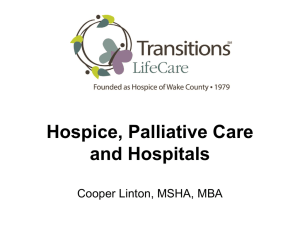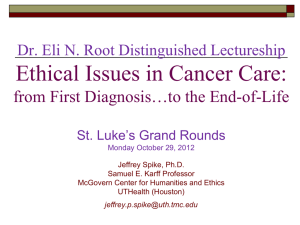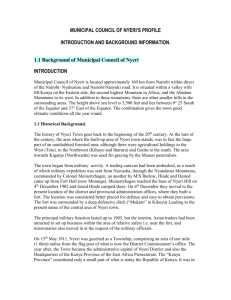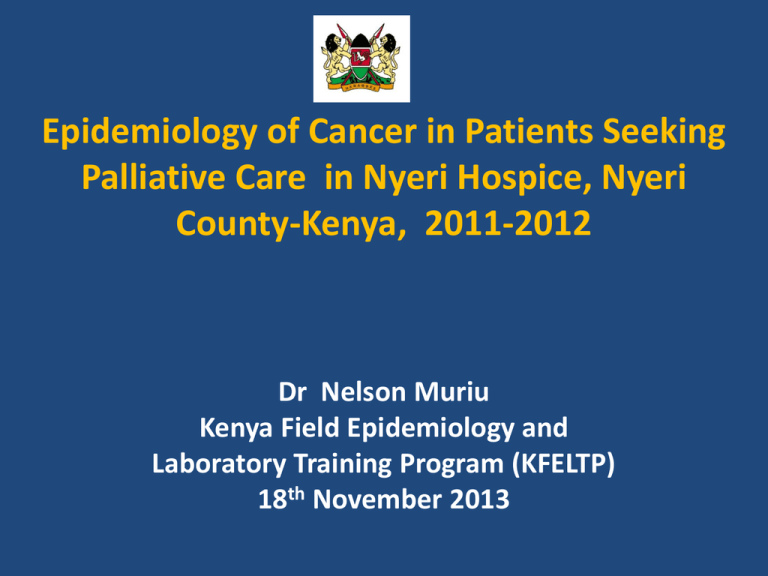
Epidemiology of Cancer in Patients Seeking
Palliative Care in Nyeri Hospice, Nyeri
County-Kenya, 2011-2012
Dr Nelson Muriu
Kenya Field Epidemiology and
Laboratory Training Program (KFELTP)
18th November 2013
Global Burden of Cancer
• A Leading cause of morbidity and mortality
worldwide
– Annual incidence estimated at 10 million
• Accounted for 7.9 million deaths in 2009
– > 70% of all cancer deaths occur in low and
middle-income countries
• By 2030, cases and deaths will increase by
69% and 72% respectively
•
•
•
•
•
Cancer in Kenya
Ranked 3rd leading cause of death
Causes 7% of total national mortality every year
Annual incidence ~28,000 cases
Annual mortality >22,000
Only two population-based registries exist
(regional)
• National cancer control strategy (2011-2016)
developed
– Strengthen cancer prevention and control in
various sectors
– Investment in cancer awareness, human
resource, equipments, surveillance and
research
Justification
• Comprehensive data on the burden and
trends of cancer lacking in most sub Saharan
Africa
• Data on cancer in Kenya are limited yet
research is a key pillar in the national cancer
control strategy
• No similar studies have been published in
Central Kenya
Objectives
– To determine the various types of cancers
in patients attending Nyeri Hospice in
Central Kenya
– To characterize the cases in time, place and
person
Study Site
• Nyeri hospice, Nyeri
county, Central-Kenya
• Started in 1995
• Caters for cancer
patients
• Offers pain relief and
treatment of
opportunistic infections
Study Design
• Retrospective descriptive study
– We reviewed patients files and registers for a
two year period
– New cancer cases registered between Jan 2011
and Dec 2012 were identified and extracted
• Study population: Cancer patients attending
Nyeri hospice for palliative care
• Case definition: A reported diagnosis of cancer
at any age admitted to Nyeri hospice between
Jan 2011 and Dec 2012 for palliative care
Data Management
• Data collection
– Socio-demographic and cancer data were
abstracted from registers and files using a
standardized form
• Data entry and cleaning
– Epi info version 3.5.4 software and Ms Excel 2007
used
• Data analysis
– Means ,medians, proportions and frequencies
calculated for categorical and continuous variables
RESULTS
Records Review
598 Records
Reviewed
Socio-Demographics
•Females were 270(60%)
•Married -260(63%)
477 Records Included
25(5%) Drop outs
352(74%)Deaths
100(21%)-Alive
21(54%) Metastasis at diagnosis
•Majority of the patients
335 (83%) resided within
the county
Leading Cancers as Registered by Nyeri
Hospice, 2011-2012(N=452)
Type of cancer
Breast
Prostate
Cervix
Oesophagus
Stomach
Liver
Rectum
Pancreas
Ovary
Others
n(%) Cases
56(21)
32(17)
46(17)
73(16)
41(9)
39(9)
21(5)
19(4)
13(3)
112(24)
Distribution of Leading Cancers in Nyeri
Hospice by Sex, 2011-2012(N=452)
Male
25
Female
% Cases
20
15
18
17
14
12
10
6
5
0
Type of Cancer
5
Distribution of Cancer Cases by Age in
Nyeri Hospice, 2011-2012 (n=448)
60
50
% Cancer Cases
40
30
20
10
0
9-24.
25-35
36-65
Age in Years
Median age of the patients-62 (Range: 9-99)
66-74
>75
Clinical Characteristics of Cancer
Cases in Nyeri Hospice, 2011-2012
• Median duration from diagnosis to death-95
days(range:8-2615, IQR: 165)
• Median duration from admission to death -44
days(range:0-530 ,IQR: 76)
• Forty-nine percent(223) of the cancer cases had
evidence of pathological diagnosis
• Median duration from first complaint to
diagnosis-810 days(range:25-3463,IQR-482)
Referral Methods of Cancer Patients
to Nyeri Hospice, 2011-2012(N=452)
100
90
80
Percent
70
60
50
40
40
37
30
20
10
12
8
3
0
Faith based
organisation
Government
Facility
Hospice
Private health
facility
Referral Method
Self
Distribution of Cancer Cases by Outcome
in Nyeri Hospice ,2011-2012
25
Percent
20
15
10
13
14
10
11
2
Dead
Alive
8
5
9
4
1
0
Type of Cancer
5
1
1
Annual Distribution of Cancer Deaths
in Nyeri Hospice, 2011-2012(n=352)
35
30
No. of Deaths
25
20
2011
15
2012
10
5
0
Jan
Feb Mar Apr May Jun
Jul
Aug
Month of Death
Sep
Oct
Nov
Dec
Discussion
• Cancer are an important public health
problem in this region
– Breast and cervical cancer main cancers in
women
• The study showed low levels of pathological
diagnosis(fifty-percent)
– Inadequate diagnosing capacity
• Lung cancer was not among the top ten
cancers
– Potential deficiencies in diagnosis
Conclusion
• Oesophagus, stomach and prostate were the leading
cancers in men.
• Commonest cancers among females were breast, cervix and
oesophagus
• Short median duration from diagnosis to death (95 days)
indicates late diagnosis
Recommendations
• Scaling up of cancer screening programs to enhance early
diagnosis
• Improve on recording at the hospice to guarantee data quality
• Public awareness on cancer prevention & control
• Strengthened diagnosing capacity
• Further epidemiological studies in cancer prevention and
control
Acknowledgements
• Nyeri Hospice CEO and staff
• Kenya field epidemiology and laboratory
Training program
• Dr J. Kibachio-(Medical EpidemiologistDNCD)
• County Health Management Team
• AFENET
THANK YOU

